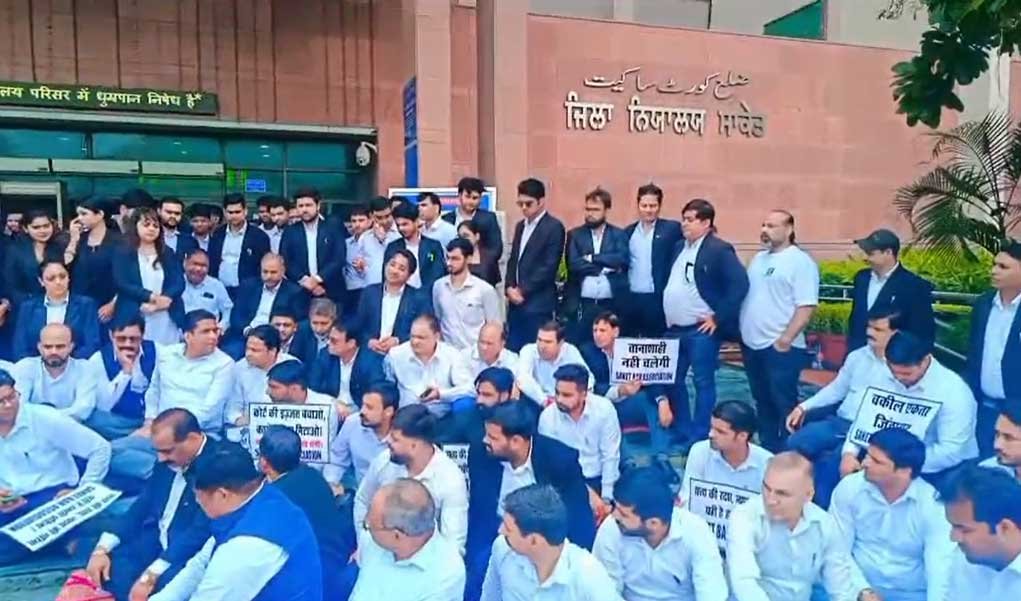On Tuesday, the otherwise bustling Saket Court Complex presented an unusual sight. The police vans, uniformed officers, and the regular hum of litigants but it’s 4th day, advocates are missing. Instead, the premises were filled only with the black coats of lawyers, standing in solidarity rather than engaging in their usual courtroom routine. Even the customary tea breaks and informal discussions among advocates had given way to slogans and silent protest.
This was day fouth of the strike called by the Coordination Committee of All District Court Bar Associations in Delhi, opposing the August 13 notification issued by Lieutenant Governor V.K. Saxena, which permits police officers to present evidence before courts virtually from police stations.
The Notification and Its Controversy
The contentious notification stems from the draft model rules (Nyaya Shruti) on video conferencing under the Bharatiya Nagarik Suraksha Sanhita (BNSS). These rules allow police stations to be designated as locations from where officers may depose through video conferencing, thereby eliminating the requirement for their physical presence in court.
However, this move contradicts a July 15, 2025 circular issued by the Union Home Secretary, which explicitly clarified that police stations or places under the control of the Police Department should not be designated for examination of witnesses via audio-video means.
Lawyers argue that the LG’s notification undermines this safeguard and creates room for manipulation of evidence, particularly in criminal trials where police officers are often principal witnesses.
Lawyers’ Stand: Compromise of Judicial Integrity
Advocates across district courts have voiced strong objections. Advocate Tarun Rana, Secretary of the New Delhi Bar Association, highlighted a critical procedural concern:
“When two police witnesses depose in court, one is usually made to wait outside while the other is cross-examined. This prevents coordination and ensures that any contradictions can be brought to record. Virtual depositions from the same police station allow for indirect communication, leaving space for manipulation.”
At Saket Court, advocates raised slogans despite heavy rain, declaring “Vakeel ekta zindabad” (long live lawyers’ unity). Advocate Dhir Singh Kasana, leading the protest, termed the notification “anti-public,” warning that the greatest harm would befall citizens accused in criminal trials.
At Rouse Avenue Court, entrances were blocked with banners reading “kaala kanoon wapas lo” (repeal the black law). Advocate Vijay Bishnoi, Secretary of the Court’s Bar Association, stated:
“This will allow police, who are themselves stakeholders in criminal investigations, to testify from stations without judicial oversight. It compromises the integrity of the criminal justice system.”
At Dwarka Court, even prosecutors were turned away after being informed that proceedings would not be conducted. Advocate Avnish Rana, President of the Dwarka Bar Association, confirmed that the Coordination Committee had spoken with Delhi’s Chief Minister, who assured them that the matter would be examined.
Meanwhile, at Tis Hazari Court, which ordinarily witnesses a daily footfall of nearly 40,000, silence prevailed. Court staff admitted they had never seen the premises so deserted. One reader noted: “No accused is being produced physically. Lawyers fear entering courtrooms—they worry about being threatened. This time, the unity is absolute.”
Broader Concerns
The heart of the protest lies in the potential imbalance created between prosecution and defence: Physical presence in court not only ensures transparency but also exposes police witnesses to cross-examination under judicial scrutiny. Allowing testimony from police-controlled premises risks creating an environment of implicit coercion or influence.
Defence advocates warn that this reform tilts the scales of justice in favour of the prosecution, thereby undermining the constitutional principle of a fair trial as guaranteed under Article 21.
The Road Ahead
The strike has now entered its fourth day, with the Coordination Committee vowing to continue until the notification is withdrawn. The issue raises a significant legal policy question:
Should efficiency and convenience in judicial proceedings take precedence over the procedural safeguards of transparency and fairness in criminal trials?
For now, the united stand of Delhi’s district bar associations has brought courtroom functioning in the capital’s six major district courts—Patiala House, Saket, Rouse Avenue, Dwarka, Karkardooma, and Tis Hazari—to a near-complete halt, underscoring the seriousness of the legal fraternity’s concerns.
Meetings are taking place between the coordination committee Ministry of Law and Justice, to roll back the impugned order. Common people are also estimating the flaws of this order; a fair trial would be at stake if police officials are allowed to depose from the police official.


